
Helping policymakers weigh the benefits of open source AI
GitHub enables developer collaboration on innovative software projects, and we’re committed to ensuring policymakers understand developer needs when crafting AI regulation.
Since 2014, we’ve posted transparency reports so everyone can see what keeps us busy on GitHub’s Legal and Support Teams. We hope you enjoy this year’s!
Similar to years past, we have continued to receive two main types of legal requests:
Disclosures, requests to disclose user information, which include:
Takedowns, requests to remove or block user content, which include:
Due to the nature of many of the disclosure requests, such as national security orders, we are prevented from sharing a lot of data about them. However, we can tell you quite a bit about takedowns. For instance, you can see exactly what we’re asked to take down because we publish all DMCA notices and government takedown requests that we process at the time we process them. That allows our users and the public to see why content is being removed.
For DMCA takedown notices, you can also see how many counter notices we process. The number of DMCA notices we’ve received and processed has risen dramatically in the past few years. We went from 258 takedown notices processed in 2014 to 505 in 2015 and 757 in 2016. Though the number of counter notices processed increased from 17 to 62 in the first two years, that number actually decreased to 20 in 2016. We thought that was interesting and wanted to highlight it for everyone. Below, we’ll get into a little more detail about DMCA notices and other requests we receive.
As you may have noticed in our guidelines for legal requests of user data, we require a subpoena for certain kinds of user information, like a name, an email address, or an IP address associated with an account, and a court order or warrant for all other kinds of user information, like user access logs or the contents of a private repository. A subpoena is a legal process that does not require review by a judge or magistrate. By contrast, a warrant or court order does require judicial review. These requests may be part of a criminal investigation or a civil dispute and may come from law enforcement, a government agency, or litigants in a civil trial.
Because some legal processes are part of ongoing criminal investigations, we may receive, along with them, a court order that forbids us from giving notice to the targeted account holder. Even when we do not receive that kind of order, there are often significant privacy concerns involved with these disputes. Therefore, we do not publish subpoenas or other legal requests for user information.
In 2016, we received 34 requests for user data. Unlike in years past, we received both warrants and court orders in 2016. These 34 requests include every request we received for user data, regardless of whether we disclosed information or not. Not all of these came from law enforcement; some of these may have come from other government agencies, from civil litigants wanting information about another party, or from foreign government agencies through the Department of Justice via a mutual legal assistance treaty or similar form of cooperation. Twenty-six of these requests for user data came from federal grand jury subpoenas that can be seen below. The chart below shows the breakdown by percentage of the different types and sources of requests we received.
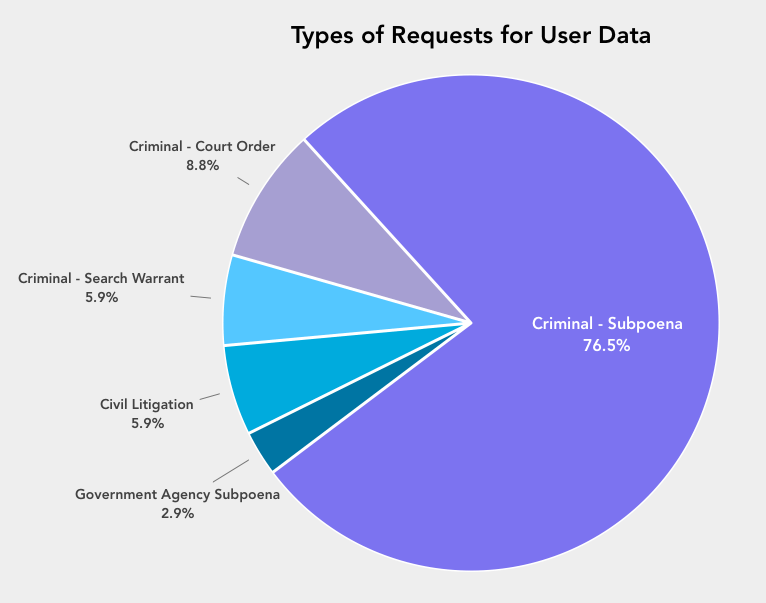
In 2016, we noticed a significant increase in requests for user data from 2015, when we received 12 requests.
In addition, we have seen an increase in the number of non-disclosure orders (also known as gag orders) attached to these requests that prevent us from notifying our users about them, almost quadrupling from seven to 27 in 2016. The chart below shows the total number of gag orders received in 2014, 2015, and 2016.
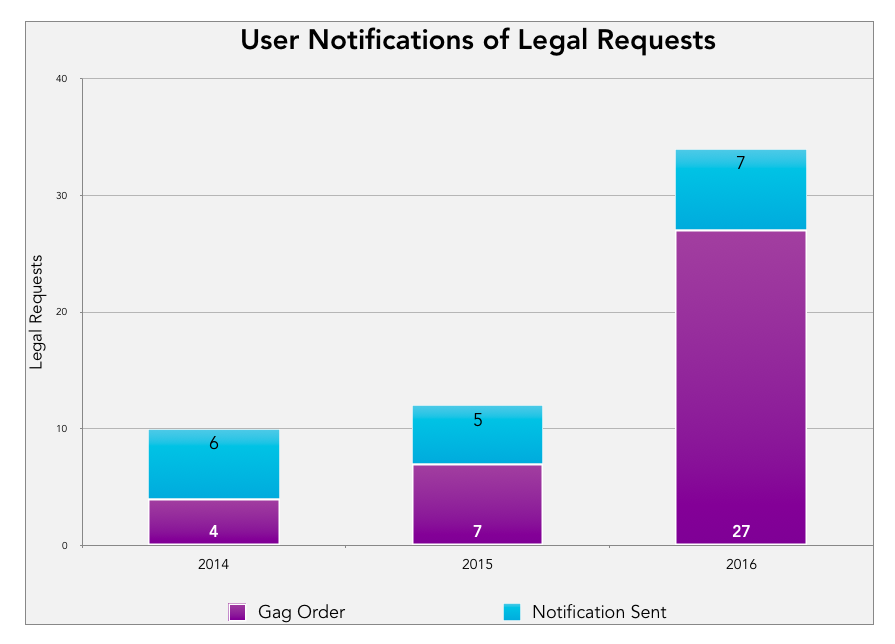
We did not disclose user information in response to every request we received. In some cases, this is because the request was not specific enough, and when we asked for clarification, the requesting party withdrew the request. In some cases, we received very broad requests, and we were able to limit the scope of the information we provided.
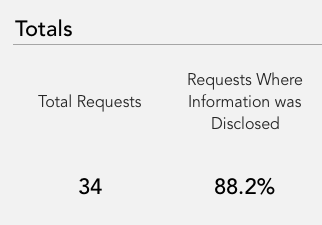
We are very limited in what we can say about national security letters and Foreign Intelligence Surveillance Act (FISA) orders. The US Department of Justice has issued guidelines that only allow us to report information about these types of requests in ranges of 250, starting with zero. The chart below shows the relevant ranges for national security orders received and affected accounts.
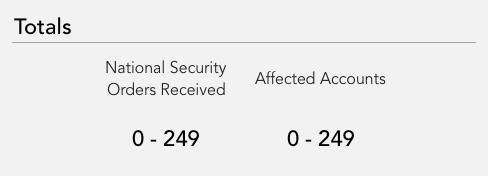
Although fairly limited, GitHub continued to see requests from foreign governments to block content. When we receive requests like this, we provide transparency in at least two ways: we notify the affected account holder before removing the content, and we post the notice publicly, to our government takedowns repository. In 2016, we received five takedown requests from Russia and one takedown request from China.
The most significant number of requests we receive for content removal are notices submitted under the Digital Millennium Copyright Act, or the DMCA. The DMCA provides a method by which copyright holders may request GitHub to take down content they believe is infringing. The user who posted the content can then send a counter notice to dispute the claim. Each time we receive a complete DMCA takedown notice, we redact any personal information and post it to a public DMCA repository. To learn more about our DMCA process, please take a look at our DMCA Takedown Policy.
In 2016, we received a significant increase in takedown notices, but took down less content than we did in 2015. This is likely because of an anomalous singular notice which resulted in 5,564 projects being removed in 2015.
Below are the total number of complete notices that we received and processed in 2016. In the case of takedown notices, this is the number of separate notices where we took down content or asked our users to remove content. To learn more about the differences between takedown notices, counter notices, and notices of legal action filed, please check out our DMCA Takedown Policy.

In 2016, we processed something new called a “reversal.” A “reversal” occurs when we become aware of new information, following a DMCA notice, that shows the original DMCA was invalid at the time of submission. The result of a reversal is the restoration of any content that was disabled as a result of the faulty DMCA notice.
By month, the notices, counter notices, retractions, and reversals we processed look like this:
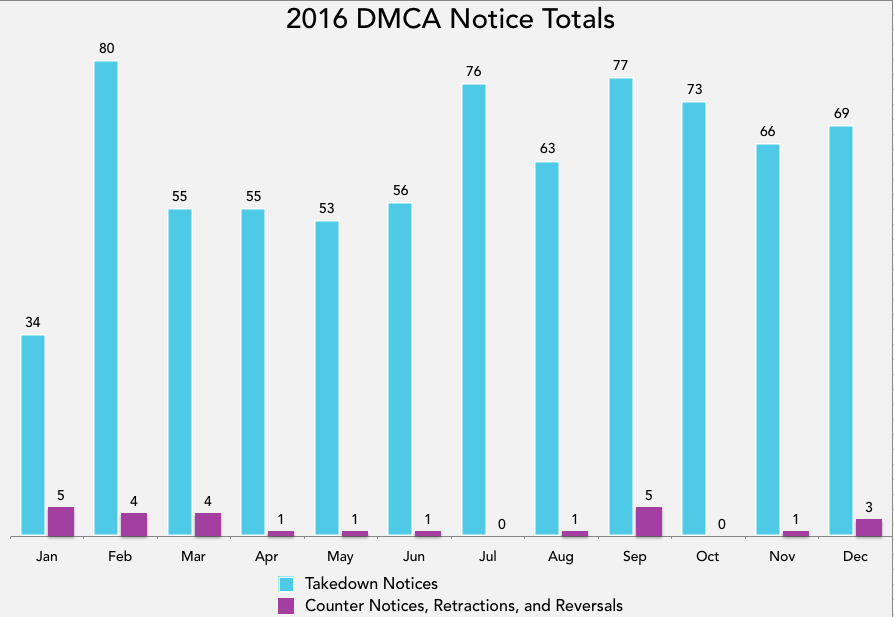
From time to time, we do receive incomplete or insufficient notices regarding copyright infringement. Because these notices don’t result in us taking down content, we don’t currently keep track of how many incomplete notices we receive, or how often our users are able to work out their issues without sending a takedown notice.
Often, a single takedown notice can encompass more than one project. So, we looked at the total number of projects, such as repositories, Gists, and Pages sites, that we had taken down due to DMCA takedown requests in 2016. By month, the projects we took down, and the projects that remained down after we processed retractions and counter notices, looked like this:

In contrast with 2015, there were no large spikes of projects taken down in 2016.
With the benefit of having tabulated DMCA data for the past few years, we can now look at the trend. As might be expected, the volume of notices received by GitHub has been increasing. Of course, the GitHub community has also been growing. When we overlay the number of DMCA notices with the approximate number of registered users over the same period of time, we can see that the growth in DMCA notices is commensurate with the growth of the community.
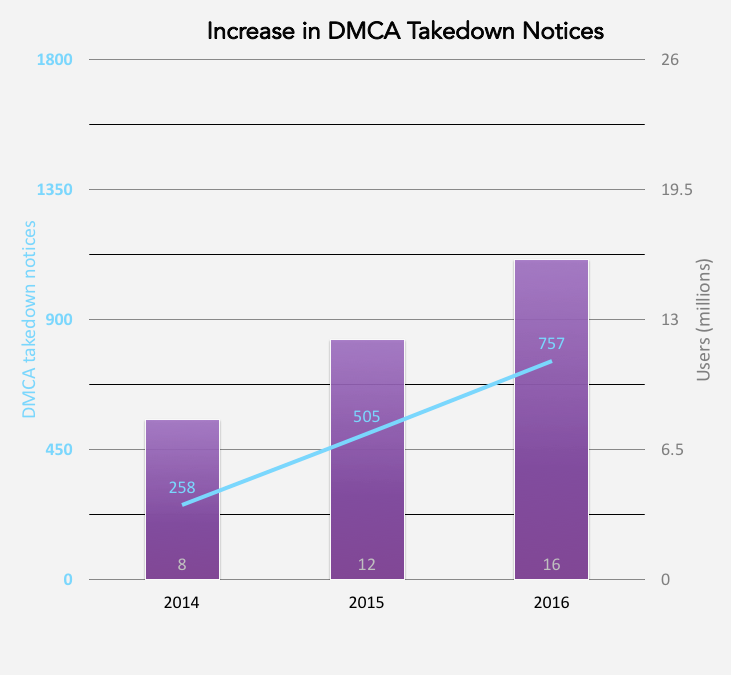
Please note, the number of registered users noted above has been approximated to the nearest million registered users at the end of each calendar year.
We want to be as transparent as possible to help you understand how legal requests may affect your projects. We hope that each year we put out a transparency report, we’ll be able to improve it with more thorough analysis and more insight into our processes, so if there’s anything you’d like to see us include in the next year’s report, please let us know.